Harvesting Crops and Goodwill
News Based on facts, either observed and verified directly by the reporter, or reported and verified from knowledgeable sources.
Queer farming grows roots in the Hudson Valley

Good morning! Today is Monday, June 20, and you are reading today’s section of Examiner+, a digital newsmagazine serving Westchester, Putnam, and the surrounding Hudson Valley.
Need to subscribe — or upgrade your Examiner+ subscription to enjoy full access to all of our premium digital content? Take advantage of our special FREE TRIAL OFFER.
Take Examiner+ on a test drive today at NO CHARGE for a full month. Enjoy full membership-level access to all of our premium local content, delivered straight to your inbox six times a week.
This is a political ad from Dana Levenberg for New York Assembly.
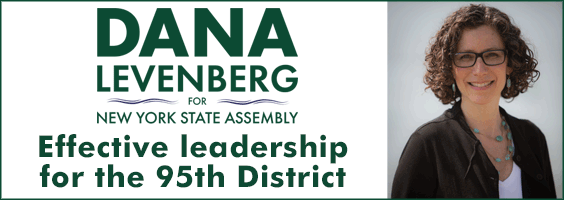
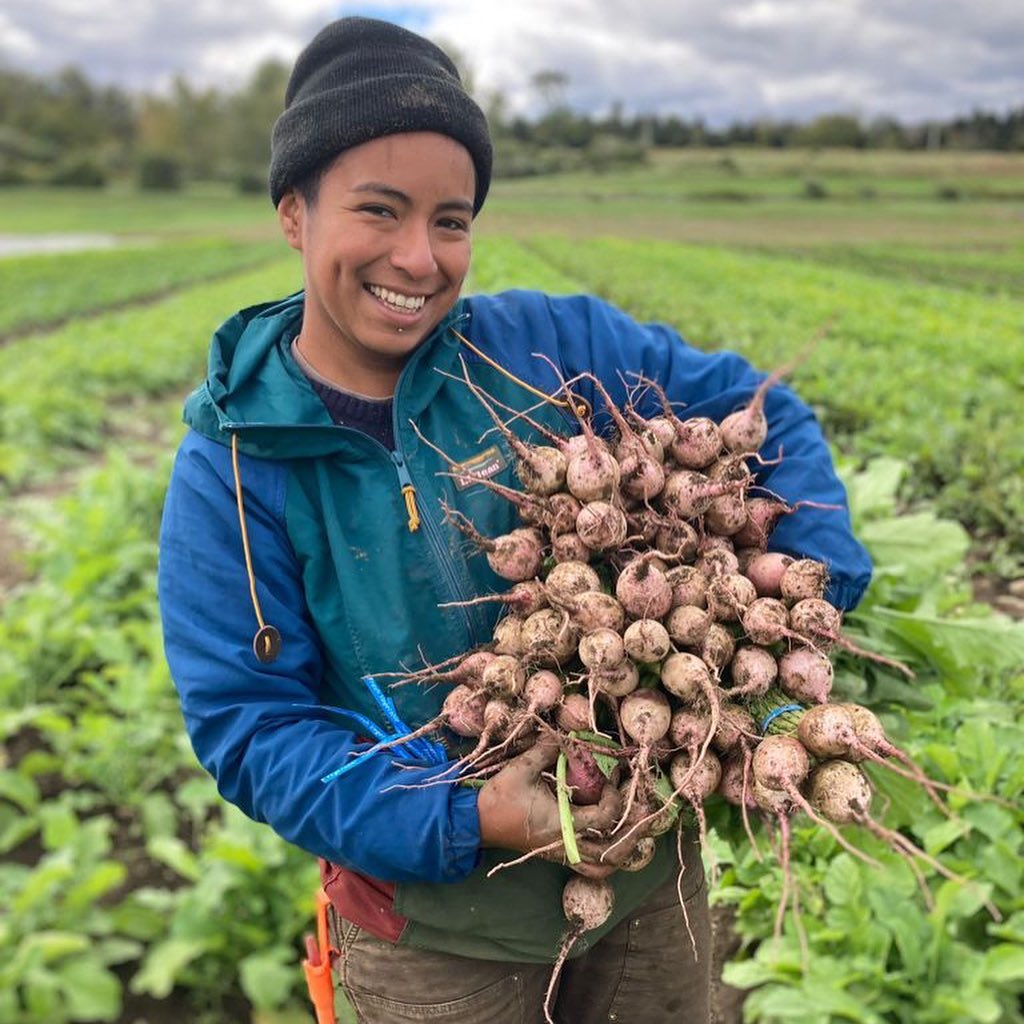
At Rock Steady, a cooperative vegetable farm located in New York’s Hudson Valley, queerness is embedded into the bedrock of its business model.
Founded in 2015, the 12-acre queer-owned and operated farm places emphasis on social justice, food access, and farmer training for LGBTQ+ and BIPOC individuals (who often face multiple barriers to accessing and maintaining safe, affirming work in the agricultural sector).
With a 500-member CSA, a food access fund that provides free and subsidized produce to low-income community members, and partnerships from Millerton and Mount Vernon to New York City, the team at Rock Steady is working to increase equity in the food system, steward its land with sustainable, regenerative practices, and create safer spaces for all farmers to thrive.
Recently, Examiner+ connected with Harvest Manager and Co-Owner Rica Bryan and Programs and Education Manager Amara Ullauri to learn more about Rock Steady’s roots, farming practices, the POLLINATE! program, and the importance of queer visibility in the agricultural sector and beyond.
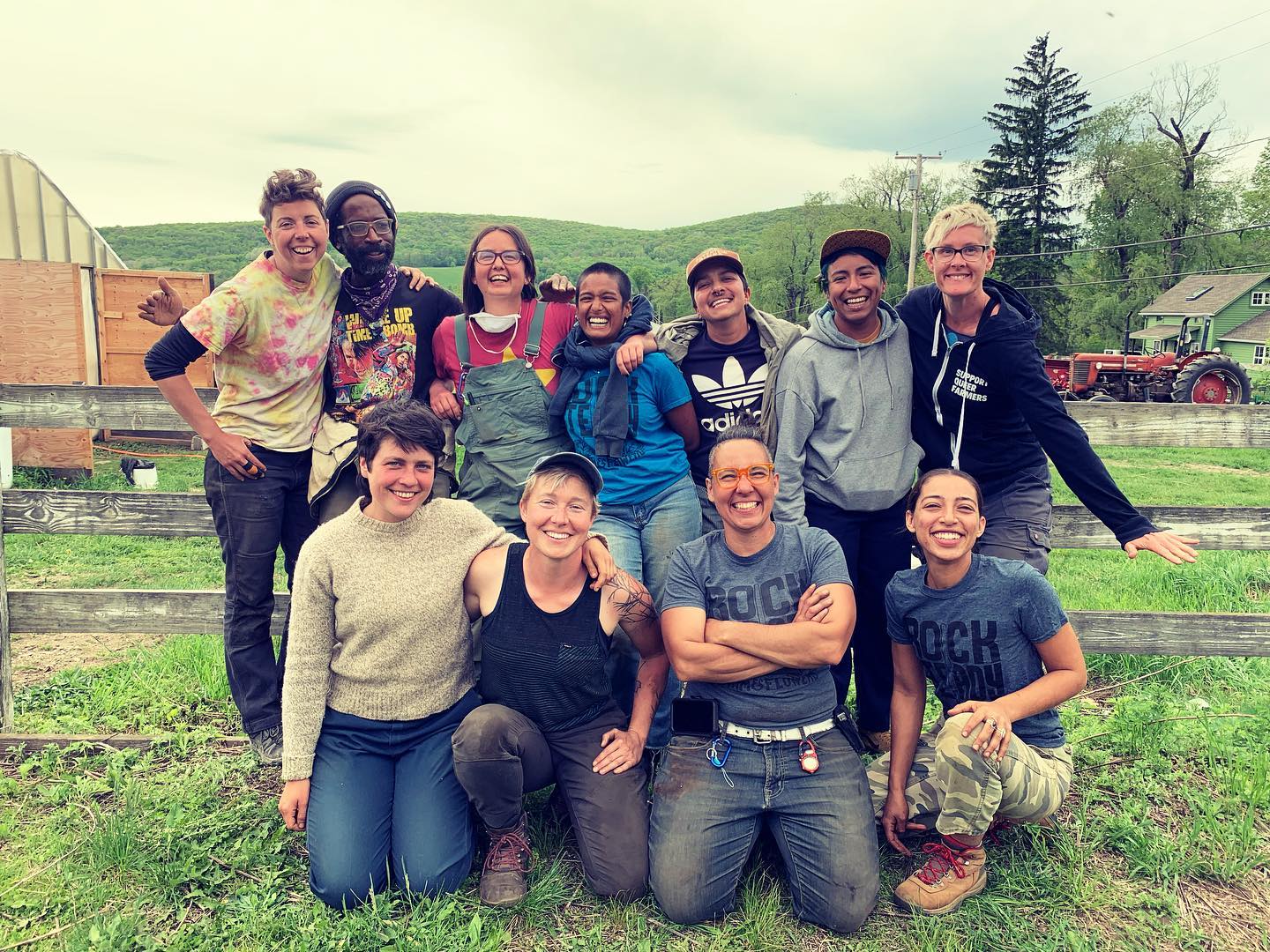
Examiner+: What were the main driving factors that led to Rock Steady being founded?
Rica Bryan: Rock Steady was founded with the intention to create a safe and affirming workplace for queer farmers. A lot of the team’s and the original founders’ previous workplace experiences were not affirming. [Many] felt like there wasn’t the capacity to really learn, skill build, and grow in a collective way.
That was also part of the intention of forming Rock Steady as a cooperative with the bylaws and structure, really holding that idea of being a space for queer farmers to share knowledge, build skills, and prioritize our food access work. It has really grown and shaped over the years, but part of the original founding intention was to really think critically of why we’re growing the food and who we’re growing it for.
Examiner+: What are some of the barriers queer, trans, and BIPOC individuals face in the traditional farming space — both in gaining employment as well as accessing skill-building and leadership opportunities?
Bryan: It’s predominantly white cisgender leadership, ownership, and management of those spaces. With that comes a lot of limitations around skill-building and building leadership in a safe and affirming space, which [results in] differences in compensation based on those skills.
I think there are a lot of barriers for queer and trans farmers to apply their wisdom, and it starts off with really low wages that have been normalized in the food system. The hourly wage is around $10 an hour, and often there are no benefits like sick leave or even health insurance. For queer farmers and farmers of color, there are many more obstacles to a safe and stable workplace.
I can’t speak to the BIPOC experience [personally], but there have been hundreds of years of systemic, institutionalized barriers for BIPOC farmers due to mass restrictions around land access, even in the last 30 to 40 years. [For BIPOC farmers], there’s a long, violent, and extractive history in this country.
The predominant amount of apprenticeship programs, especially here in the Hudson Valley, are unpaid. Those opportunities are really limited to folks who can afford to work for free or take the time to just spend on education-building. Some of those programs can really be exploitative in that they’re using free or cheap labor.
That combination of factors really limits entry into the [farming] space and skill-building and leadership opportunities, let alone just [providing] a safe work environment.
Amara Ullauri: There’s an overwhelming lack of safe spaces to learn that hold our queerness and gender expansiveness, where basic things like pronouns are considered or have proper bathrooms or changing areas.
There’s also a lack of support and overall resources needed to support people’s access to learning and training opportunities. Many internships or apprenticeship opportunities require time and labor to get the experience. Oftentimes this is unpaid time, and the understanding is that there is an exchange of knowledge for labor. I think, unfortunately, this has been a dynamic that too many farms have relied on and has contributed to the ongoing exploitation of and reliance on underpaid and cheap labor.
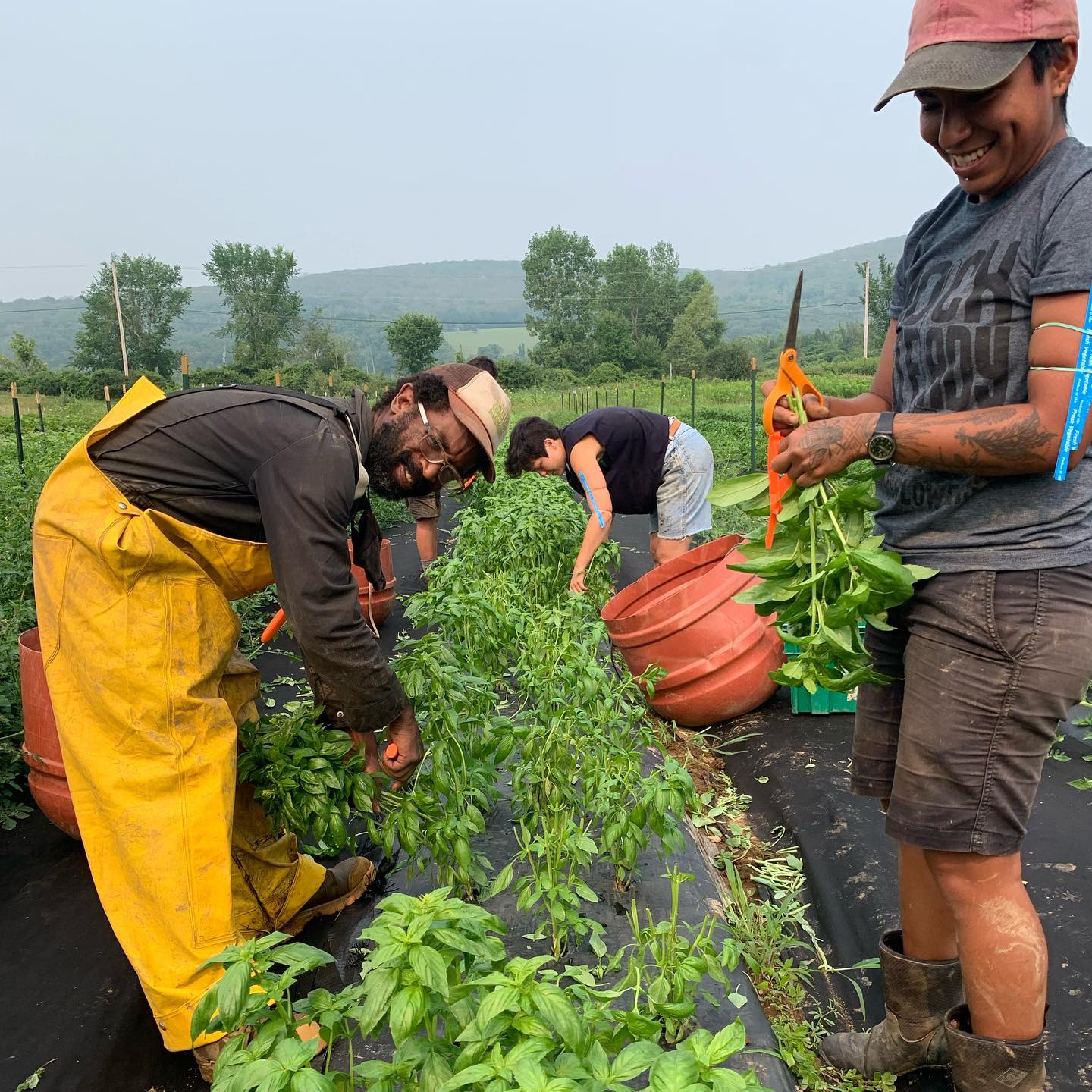
Examiner+: Rock Steady has a new paid apprenticeship program for aspiring and beginner queer and trans farmers, POLLINATE!, which kicks off this summer. Can you tell me what inspired the program and how it will address some of these barriers?
Ullauri: We wanted to create a program where folks feel safe, where their queerness and their gender expansiveness are celebrated, and where they’re receiving the support in order to access the training. [That means offering] the funds for traveling here, to cover groceries for the week that they’ll be learning, and payment for their learning time. We’re also offering housing because we are in a rural context and housing is really hard to come by, even for us farmers who live here year-round.
“We’re visible because we want people to know that we exist as queer farmers and for other queer farmers to see themselves in us. Also for young people to see that this is something they can do.” — Rica Bryan
Bryan: Alongside the paid apprenticeship program, we also have a tractor training program, which is a skillset that has really been very selective over the years. There are not a lot of programs out there that are specific for queer and trans farmers to learn tractor skills, which tend to be a very highly coveted skill in a farm space. So we’re really excited about that.
Ullauri: [Tractor training] is a critical thing to have on a farm that also allows you to have transferable skills into another job. Oftentimes these types of specialized skills are only available to managers or owners, and specifically to cis men.
Examiner+: How many farmers expressed interest in the POLLINATE! program?
Bryan: We had about 315 applications for eight spots.
Ullauri: We received applications from all over the country and abroad.
Examiner+: How did it feel to receive so many applications? I imagine it demonstrates the importance of the safe and affirming environment Rock Steady has cultivated.
Bryan: It’s just so moving, and it’s a bittersweet feeling. We’re just getting this [program] rolling with eight spots, and there’s so much interest. It demonstrates the real need, chomp, and desire for this type of space. For me, when I heard [about the application numbers], I was like, “People want to be in a community like this. People want to be skill-building like this.”
Ullauri: It’s been a very humbling experience. Reading so many people’s stories who are looking toward us not only for a learning experience but also to connect on a community level. For me personally, that feels really important.
Living in this really rural context, isolation adds another layer that is intensified when you are a queer and trans person. To feel like there are so many of us out there invested in building new worlds for farming is really beautiful.
At the same time, that’s a lot of nos that we have to say because of our limited capacity. I do believe that we should not be the only ones doing this work. There’s a lot of advocacy work, training, and encouragement ahead for other farms — specifically other queer-led farms — to brainstorm ways to build capacity toward operating training programs [like ours].
Examiner+: How does the way Rock Steady operates provide more inclusive opportunities for prospective farmers?
Ullmauri: Given that we live in the country and are part of a global food system that is based on genocide, exploitation, and invisibling who is actually doing the labor, it is important that we are creating internal practices and training for future farmers that celebrates diverse approaches to farming. This invites multiple ways of learning and creates space for neurodivergent people beyond just creating a safe space for queer, gender-expansive people.
For us, it looks like creating shared leadership, which I think is inherent in a cooperative model with multiple worker-owners involved, but even with non-owners too. I think shared leadership allows us to have multiple voices, multiple leadership approaches, and skill-building that can support farmers in setting up their own projects or influencing other farming spaces beyond Rock Steady.
Part of creating a safer and inclusive environment within the farm as well requires us to acknowledge and make space for reflecting on what support we need in order to show up and feel well doing this work with each other. That requires building trust in the team so that I can share a support request, and it will be heard and integrated into how we care for each other.
It goes hand-in-hand with building a workplace culture also that is very focused on consent beyond just physical touch but also emotional boundaries. I think all of these are antidotes to the ways that overwork and burnout are oftentimes celebrated in the agricultural fields as markers of success.
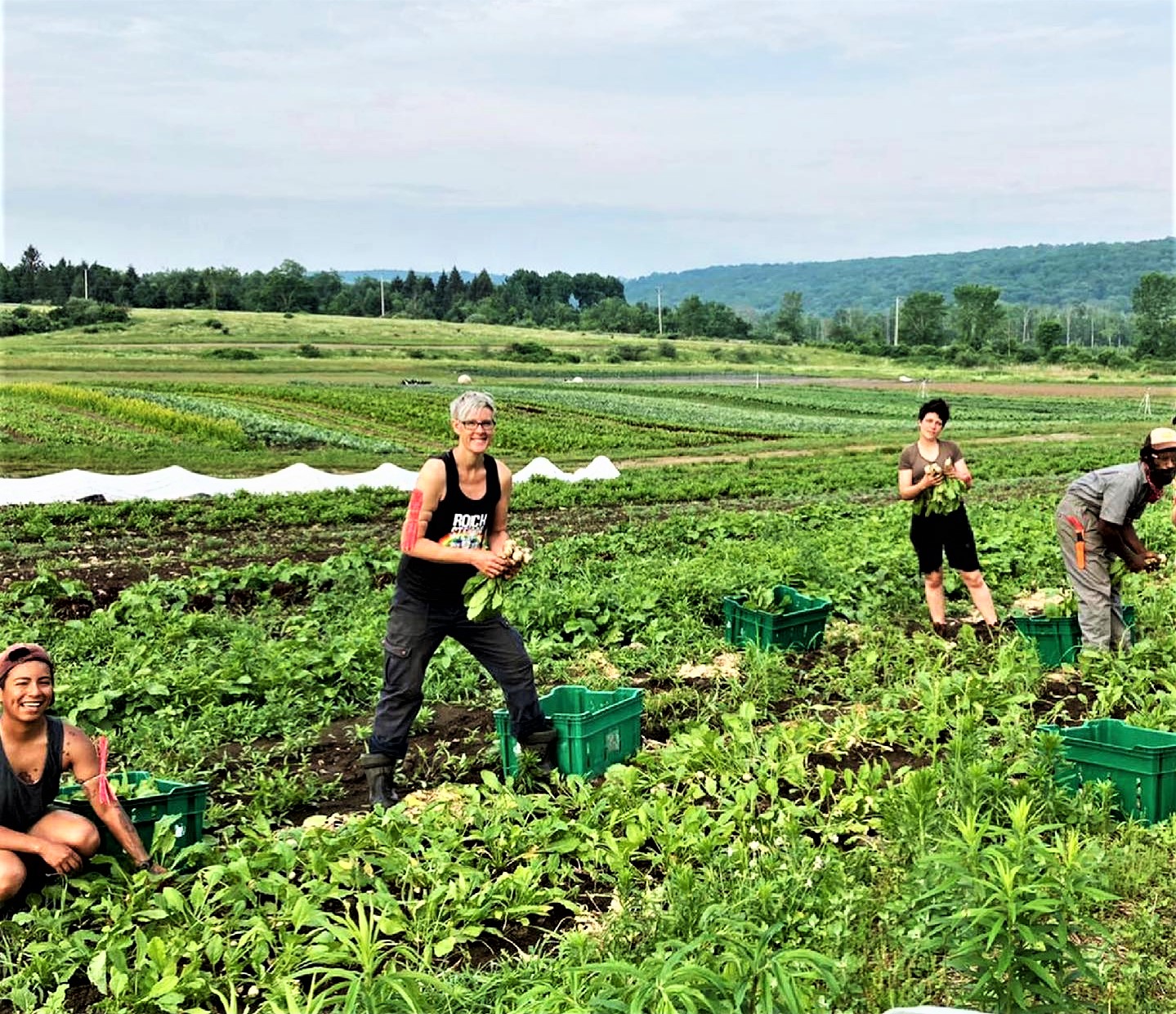
Examiner+: How important is representation and queer visibility to you and your fellow farmers — both in the agricultural space and the broader community?
Bryan: I’ve been here for four years, and over those four years, the farm’s choice points around visibility have been really intentional. [There has been] a shift from creating a safe, queer workplace for our team to also saying [to the community], “We are Rock Steady. We’re a queer collective. This is an important thing that you should know about us.”
We’re visible because we want people to know that we exist as queer farmers and for other queer farmers to see themselves in us. Also for young people to see that this is something they can do. For [people] across age demographics to see that farming includes queerness and farming includes queer farmers.
To be visible and to sometimes take that risk of visibility (which, as a white person, I can take) feels worth it.
Ullauri: Living in a country where there have been 240 anti-LGBTQ bills drafted across many states, it feels vital to be very visible. These laws are seeking to invisiblize us, so, for me, representation through visibility when it’s safe to do so feels crucial for us to build resiliency, advocacy tools, and connections so that we can share resources in the face of all of these attacks against our existence.
Being in New York, there’s sometimes this liberal mentality of our protections and how racism and homophobia are [only] happening elsewhere. I think it’s also important for us to share how we’re also experiencing those forms of violence — even here — and call attention to and action within our home state.
Living in Millerton, we feel very closely connected to the LGBTQ+ community in the Hudson Valley and in New York City, which is where a lot of our food goes to. That feels important for us too. Through our storytelling, we can share a transparent and honest view of who we are as people, farmers, organizers, and educators. I hope that creates an affirmation that we are allowed to exist in farming and a rural community. That visibility has been super important in our community-building and advocacy work for us.
Examiner+: How does queerness help inform the way you approach work at Rock Steady?
Ullauri: It informs the way that we create our internal workplace culture built on relationships. It guides how we treat each other with respect and integrity, rather than seeing each other as sources to extract labor and information. It informs our commitment to our community agreements, how we define safety and well-being for each other, and help to fill the gaps where the legal system fails to protect us.
I think it also guides who we connect to in terms of our broader community and where our food goes. Being that we are a queer-owned and operated farm, some of our longest-lasting partners have been community centers and healthcare centers that predominantly work with the LGBTQ+ community because we’ve either experienced or witnessed how the results of food apartheid within the queer and trans community — and specifically in the Black and brown community — results also in health disparities.
Bryan: We talk about queerness all the time, and it’s never a linear conversation, which I think is a beautiful thing. A lot of us relate to queerness and the land in a way that’s collective, expansive, non-linear, and non-binary. [Queerness] really informs the way that we do our work, ask questions of each other, strategize, and build efficient systems.
For me, queerness in this work is existing as our whole selves in this space and also in the way that we connect to the land. It’s a way of being, seeing, and cultivating space together that feels expansive, curious, creative, and supports lots of inquiry. I think it’s a really tender thing to tend to in a queer community.
You have to be in constant inquiry and collaboration with people in order to maintain safety. And to that point, we’re in a rural space, and we try to create some kind of container here — a container that is semi-permeable. We also want to build with our neighbors and our community. That’s really important.
There’s so much joy in this work, and it’s that joy that we get to share. A lot of our CSA members are choosing us because we are a queer farm, but others are just super pumped about our vegetables and think they taste great. We’ve worked with restaurants that may not share the same politics that we do, but they think we grow beautiful food, and we’re excited to partner. I feel grateful to be in that kind of exchange, engaging with food in this way.
Bailey Hosfelt is a full-time reporter at Examiner Media, with a special interest in LGBTQ+ issues and the environment. Originally from Connecticut and raised in West Virginia, the maternal side of their family has roots in Rye. Prior to Examiner, Bailey contributed to City Limits, where they wrote about healthcare and climate change. Bailey graduated from Fordham University with a bachelor’s in journalism and currently resides in Brooklyn with their girlfriend and two cats, Lieutenant Governor and Hilma. When they’re not reporting, Bailey can be found picking up free books off the street, shooting film photography, and scouring neighborhood thrift stores for the next best find. You can follow Bailey on Twitter at @baileyhosfelt.
Examiner Media is a proud participant in The Trust Project.
CLICK HERE to review our best practices and editorial policies.
This piece is a news article. CLICK HERE to learn about our definitions for types of stories.
We welcome corrections, story ideas, and general feedback. CLICK HERE to use our actionable feedback form.
Visit www.TheExaminerNews.com to read our hyperlocal online community news, sports, and feature coverage.

Examiner Media – Keeping you informed with professionally-reported local news, features, and sports coverage.

